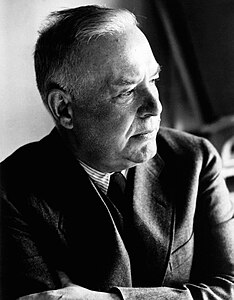Analysis of Bantams in Pine-woods
Wallace Stevens 1879 (Reading) – 1955 (Hartford)
Chieftain Iffucan of Azcan in caftan
Of tan with henna hackles, halt!
Damned universal cock, as if the sun
Was blackmoor to bear your blazing tail.
Fat! Fat! Fat! Fat! I am the personal.
Your world is you. I am my world.
You ten-foot poet among inchlings. Fat!
Begone! An inchling bristles in these pines,
Bristles, and points their Appalachian tangs,
And fears not portly Azcan nor his hoos.
| Scheme | XX XX XX XX XX |
|---|---|
| Poetic Form | Couplet |
| Metre | 1011101 11110101 101011101 11111101 1111110100 11111111 111100111 11110011 100110101 011101111 |
| Closest metre | Iambic pentameter |
| Characters | 391 |
| Words | 71 |
| Sentences | 14 |
| Stanzas | 5 |
| Stanza Lengths | 2, 2, 2, 2, 2 |
| Lines Amount | 10 |
| Letters per line (avg) | 31 |
| Words per line (avg) | 7 |
| Letters per stanza (avg) | 61 |
| Words per stanza (avg) | 14 |
Font size:
Submitted on May 13, 2011
Modified on March 05, 2023
- 21 sec read
- 341 Views
Citation
Use the citation below to add this poem analysis to your bibliography:
Style:MLAChicagoAPA
"Bantams in Pine-woods" Poetry.com. STANDS4 LLC, 2024. Web. 3 May 2024. <https://www.poetry.com/poem-analysis/37883/bantams-in-pine-woods>.


Discuss this Wallace Stevens poem analysis with the community:
Report Comment
We're doing our best to make sure our content is useful, accurate and safe.
If by any chance you spot an inappropriate comment while navigating through our website please use this form to let us know, and we'll take care of it shortly.
Attachment
You need to be logged in to favorite.
Log In